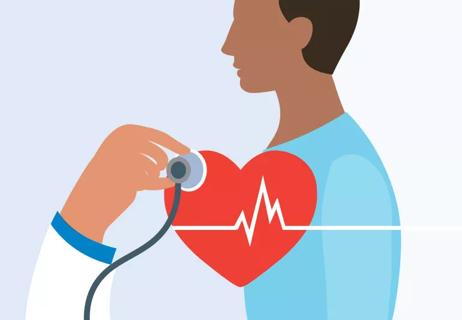Advertisement
OTC options are unhelpful at best, while some prescriptions can raise your arrhythmia risk

As a superstar of the supplement aisle, fish oil is said to have all sorts of benefits for your heart health. But does it really live up to the hype?
Advertisement
Cleveland Clinic is a non-profit academic medical center. Advertising on our site helps support our mission. We do not endorse non-Cleveland Clinic products or services. Policy
It turns out that at best, fish oil pills aren’t likely to do much good for your health — and at worst, they can actually increase your risk for stroke.
Preventive cardiologist Luke Laffin, MD, separates fact from fiction when it comes to fish oil supplements.
Proponents claim that fish oil can lower your risk of heart disease by decreasing blood pressure and cholesterol. That’s because fish oil supplements are a pill form of omega-3 fatty acids, which have been studied for decades and have proven benefits for heart health.
Omega-3 fatty acids are essential nutrients found in fish like herring, wild salmon, bluefin tuna and mackerel. Your body can’t make them on its own, which is why fish that are high in omega-3 fatty acids are such an important part of a healthy diet.
“Populations that eat a lot of fish that contain omega-3 fatty acids have a lower instance of heart disease,” Dr. Laffin notes. Consuming 1 to grams of omega-3s per day can:
Over-the-counter (OTC) fish oil supplements contain a low dose (about 1 gram) of two different omega-3 fatty acids: docosahexaenoic acid (DHA) and eicosapentaenoic acid (EPA). Prescription fish oil pills contain about 4 grams of either a DHA/EPA combo or pure EPA.
Advertisement
When it comes to OTC fish oil supplements, there’s just one caveat: There’s no real proof that they do much of anything.
“We know that people who consume high levels of omega-3 fatty acids by eating fish have a lower risk of cardiovascular events,” Dr. Laffin says, “but that hasn’t been borne out in studies about over-the-counter doses of fish oil.”
The existing data just isn’t very convincing, he states.
“There have been very large studies done by very reputable organizations, and they just didn’t show any difference in cardiovascular risk reduction or other health benefits.”
When it comes to prescription fish oil, there’s some conflicting and controversial information to sort through.
“This is an area of controversy,” Dr. Laffin says. “Many cardiologists have taken the position that the evidence is not very good for the benefits of prescription fish oils. We need more studies in order to be able to give a strong recommendation to take these products.”
A large study showed that people who took a pure-EPA fish oil pill reduced their risk of cardiovascular disease by 25%, compared to people who took a placebo.
That seems like good news. But the placebo was actually not a placebo at all; it was mineral oil, which has since been shown to have some negative cardiovascular effects, like increasing inflammation.
“If the placebo is doing bad things, it may make the drug look good,” Dr. Laffin explains.
A 2021 study found that high doses of fish oil have no effect on reducing major cardiac events in people who are at high risk for them. That study looked at more than 13,000 patients who were already taking statins to lower their cholesterol. The placebo was corn oil, which is thought to be more neutral than mineral oil. That study found no significant reduction in:
The study ended early when researchers found that fish oil wasn’t showing any benefits and was shown to increase chances of atrial fibrillation, a form of arrhythmia (irregular heartbeat) that can lead to a stroke.
“People who are at a high risk for heart disease don’t have a whole lot of great treatment options aside from statins, so in some cases, the benefits of pure EPA fish oil may outweigh potential risks,” Dr. Laffin says, “but I prescribe it very sparingly.”
Taking OTC supplements is always risky, as they’re not regulated by the U.S. Food and Drug Administration (FDA).
“You want to take medications that have proven benefits,” Dr. Laffin advises. “When it comes to fish oil, at best you’re just losing money on supplements that don’t do anything. At worst, they can have negative impacts.”
Advertisement
Some fish oil supplements have been tested by consumer organizations and found to be contaminated with mercury. And even safe, low-dose fish oil supplements (though again, there’s no way to tell!) can have unpleasant side effects, including:
Higher-dose prescription fish oil comes with additional risks:
If you’re at high risk for heart disease, talk to your doctor about the best options for lowering your risk. And if you just want to be sure you’re getting all the benefits of omega-3 fatty acids, it’s best to skip the fish oil supplements and just make salmon for dinner instead.
Advertisement
Learn more about our editorial process.
Advertisement

Age, sex and genetics are just a few factors that can affect your risk of developing coronary heart disease

A resting heart rate below 35–40 beats per minute or over 100 beats per minute may be cause for concern

They’re rarely cause for concern, but you should still talk to a healthcare provider about your symptoms

Your heart rate naturally slows down while you sleep, but lower numbers aren’t always concerning

Making healthy lifestyle changes ahead of surgery can help you avoid AFib after

A skipped heartbeat is usually your heart returning to its normal electrical path

A healthy gut benefits your entire digestive system — and more

Not all rainbows have gold at the end — the ones our bodies produce offer insight into our health

Keeping a sleep diary and seeing a sleep specialist can help you stay asleep and get the ZZZs you need

Keeping a sleep diary and seeing a sleep specialist can help you stay asleep and get the ZZZs you need

Hormone changes can definitely leave you tossing and turning at night, but help is available